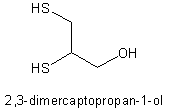Dimercaprol
British anti-Lewisite, often referred to by its acronym BAL, is a compound developed by the British biochemists at Oxford University during World War II. It was developed secretly as an antidote for the arsenic-based chemical warfare agent Lewisite, effectively rendering it obsolete. Today, it is used medically in treatment of arsenic, mercury and lead, and other heavy metal poisoning. In addition, it is used for the treatment of Wilson's disease, a genetic disorder in which the body tends to retain copper. more...
Biochemical function
Heavy metals act by chemically reacting with adjacent sulfhydryl residues on metabolic enzymes, creating a chelate complex that inhibits the affected enzyme's activity. British anti-Lewisite competes with the sulfhydryl groups for binding the metal ion, which is then excreted in the urine.
BAL is itself toxic, with a narrow therapeutic index and a tendency to concentrate arsenic in some organs. Other drawbacks include the need to administer it by painful intramuscular injection.
Read more at Wikipedia.org



